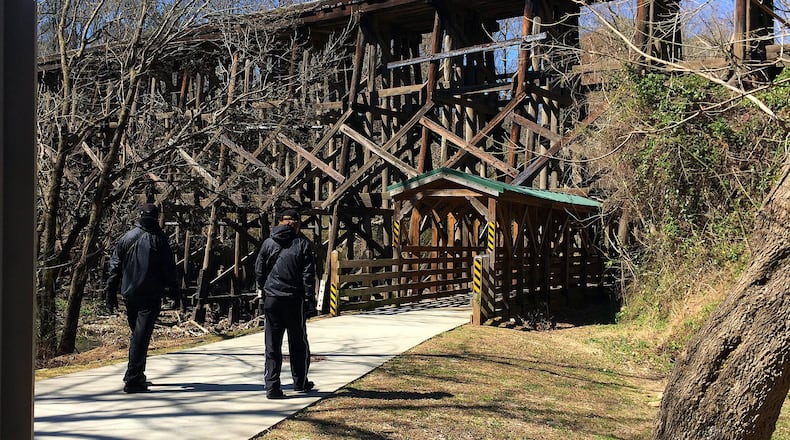A new tech startup company that hoped to use the term “beltline” in its name has backed off after receiving a legal threat from the nonprofit agency developing the Beltline greenspace project.
Michael Tavani, co-founder of Scoutmob, announced last week a new startup incubator called Beltline & Co., which will be housed in the Ponce City Market development next to the Atlanta Beltline’s popular Eastside Trail. Now he’s opened a competition to find a new name for the company.
Tavani’s budding business is unrelated to Atlanta Beltline Inc., the nonprofit overseeing the build-out of that project’s 22-mile loop of parks, trails and transit. Nor is Beltline & Co. part of the Atlanta Beltline Partnership, the project’s philanthropic sidekick.
But for the Atlanta Beltline, his company’s name was too close for comfort. As The Atlanta Journal-Constitution first reported online Tuesday, Beltline officials quickly sent Tavani a cease-and-desist letter warning him against using the name because of trademark infringement.
According to Beltline spokesman Ethan Davidson, the legal threat is about brand preservation.
“Our mission is to build the Atlanta Beltline – a project for the benefit of the public that is wholly owned by the public. It is also our responsibility to be good stewards of this asset and its brand to protect it for the public good,” Davidson said in a statement.
Tavani, who said he researched the issue before settling on the name, is skeptical that he’s violating the trademark. He believes his tech startup is different enough to distinguish itself from the greenspace project.
Though Atlanta Beltline has registered the terms “Atlanta Beltline” and “Beltline” in dozens of uses with the U.S. Patent & Trademark Office in recent years, Tavani questions the nonprofit’s ability to claim all rights to a common word.
Much like Apple can’t exclusively own rights to the name of the fruit, no one can exclusively own “beltline,” he believes.
“Beltline is a generic term. It’s not unique to Atlanta,” Tavani said in a previous interview with The AJC. “Atlanta has the most famous beltline, but there are beltlines in many other cities.”
That’s true. There’s the Birmingham Northern Beltline corridor, a Beltline Animal Hospital in Wisconsin and a swath of beltline insurance groups, bars and other businesses across the country. And the term “beltline” itself commonly refers to a transportation system that can encircle an area, much like the rail lines at the heart of the Atlanta Beltline’s design.
The 34-year-old Atlanta native said he was inspired by a trend in venture capitalism to name companies after local landmarks, such as Brooklyn Bridge Ventures or Golden Gate Ventures. Similarly, he sees the Beltline as an Atlanta attraction, and said using the b-word is an homage to the project originally conceived by Ryan Gravel in the late 1990s.
“The actual Atlanta Beltline is part of what we stand for: authentic, creative, design-focused and it’s urban,” Tavani said. “We wanted to pay respect to that project, which I think is one of the neatest in my lifetime.”
In a post on his website Thursday — titled "Why I changed the name of my company only a week after we launched" — Tavani maintains he isn't violating the trademark. But Tavani says the cost of litigation is too great.
“Sure, I have a winnable legal case, but that just feels ridiculous to even go there … I want this incubator to be a positive for the community,” he wrote. “This should be, much like a startup, a place where ideas move fast and we spend time only on the things that we love (and that matter).”
The flap has an interesting wrinkle. Mayor Kasim Reed has made growing the tech industry a goal for his second term. Atlanta economic development officials want the Beltline to be a magnet for businesses, including startup and high-tech companies.
Indeed, fast-growing tech companies athenahealth and MailChimp have announced plans to move into Ponce City Market, lured by the vibe of the massive redevelopment of City Hall East and the surrounding network of trails.
But officials have been ultra-protective of the Beltline’s name and trademarks.
Michael Landau, a Georgia State University law professor who specializes in intellectual property, said the use of beltline is complicated and depends mostly on what the average person thinks of when hearing the term.
Under typical trademark principles, the beltline would have to have a so-called secondary meaning, he said.
“That means in the minds of customers, the Beltline belongs to or is associated with a specific entity and it’s not just an indicator of a place,” Landau explains.
In other words, to suggest trademark violation, most people would have to think of “beltline” specifically as Atlanta’s greenspace project.
Landau explains that proving trademark dilution, or that a similar trademark harms the original mark, doesn’t require proving a person could confuse the two.
“There’s the question of whether the Beltline is famous enough to be able to claim: ‘We’re the Beltline and we have rights to all uses of the name,’ ” he said.
Tavani isn’t the first to try to capitalize on “beltline” for business. Atlanta’s already home to Atlanta Beltline Bicycle and Beltline Bike Shop, not to mention The Beltline Team, a real estate firm.
Davidson said Atlanta Beltline Inc. has negotiated a licensing agreement with the real estate company and is reaching out to the bike shops for a similar arrangement. Licensing fees are reinvested into the development project.
Tim Bailiff, co-owner of Atlanta Beltline Bicycle, confirmed the nonprofit has contacted his business about the name. He declined to say what the company has decided to do in response.
But he said his shop’s location is more powerful than the name. Atlanta Beltline Bicycle sits just steps from the Eastside Trail, which is flush with pedestrians and cyclists.
“It’s location, location, location,” he said. “…We can be called ‘The Bike Shop’ and do just as well.”
About the Author
The Latest
Featured


